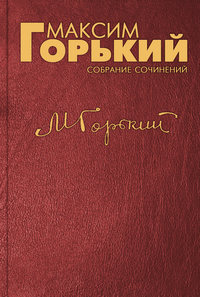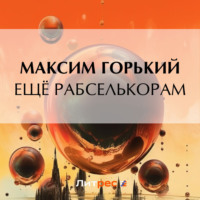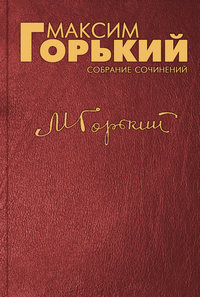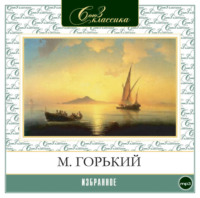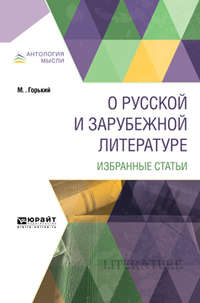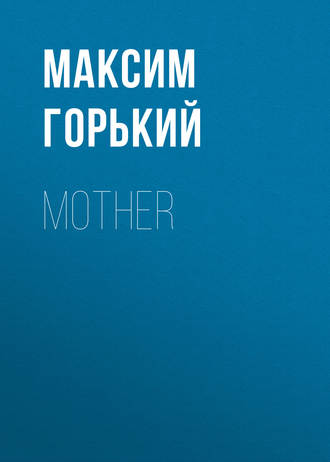 полная версия
полная версияMother
"God sees the righteous," she murmured.
At length the throng of people in the gray coats tumbled out on the porch, and their spurs jingled as they disappeared. Rybin went last. He regarded Pavel with an attentive look of his dark eyes and said thoughtfully: "Well, well – good-by!" and coughing in his beard he leisurely walked out on the porch.
Folding his hands behind his back, Pavel slowly paced up and down the room, stepping over the books and clothes tumbled about on the floor. At last he said somberly:
"You see how it's done! With insult – disgustingly – yes! They left me behind."
Looking perplexedly at the disorder in the room, the mother whispered sadly:
"They will take you, too, be sure they will. Why did Nikolay speak to them the way he did?"
"He got frightened, I suppose," said Pavel quietly. "Yes – It's impossible to speak to them, absolutely impossible! They cannot understand!"
"They came, snatched, and carried off!" mumbled the mother, waving her hands. As her son remained at home, her heart began to beat more lightly. Her mind stubbornly halted before one fact and refused to be moved. "How he scoffs at us, that yellow ruffian! How he threatens us!"
"All right, mamma!" Pavel suddenly said with resolution. "Let us pick all this up!"
He called her "mamma," the word he used only when he came nearer to her. She approached him, looked into his face, and asked softly:
"Did they insult you?"
"Yes," he answered. "That's – hard! I would rather have gone with them."
It seemed to her that she saw tears in his eyes, and wishing to soothe him, with an indistinct sense of his pain, she said with a sigh:
"Wait a while – they'll take you, too!"
"They will!" he replied.
After a pause the mother remarked sorrowfully:
"How hard you are, Pasha! If you'd only reassure me once in a while! But you don't. When I say something horrible, you say something worse."
He looked at her, moved closer to her, and said gently:
"I cannot, mamma! I cannot lie! You have to get used to it."
CHAPTER VII
The next day they knew that Bukin, Samoylov, Somov, and five more had been arrested. In the evening Fedya Mazin came running in upon them. A search had been made in his house also. He felt himself a hero.
"Were you afraid, Fedya?" asked the mother.
He turned pale, his face sharpened, and his nostrils quivered.
"I was afraid the officer might strike me. He has a black beard, he's stout, his fingers are hairy, and he wears dark glasses, so that he looks as if he were without eyes. He shouted and stamped his feet. He said I'd rot in prison. And I've never been beaten either by my father or mother; they love me because I'm their only son. Everyone gets beaten everywhere, but I never!"
He closed his eyes for a moment, compressed his lips, tossed his hair back with a quick gesture of both hands, and looking at Pavel with reddening eyes, said:
"If anybody ever strikes me, I will thrust my whole body into him like a knife – I will bite my teeth into him – I'd rather he'd kill me at once and be done!"
"To defend yourself is your right," said Pavel. "But take care not to attack!"
"You are delicate and thin," observed the mother. "What do you want with fighting?"
"I will fight!" answered Fedya in a low voice.
When he left, the mother said to Pavel:
"This young man will go down sooner than all the rest."
Pavel was silent.
A few minutes later the kitchen door opened slowly and Rybin entered.
"Good evening!" he said, smiling. "Here I am again. Yesterday they brought me here; to-day I come of my own accord. Yes, yes!" He gave Pavel a vigorous handshake, then put his hand on the mother's shoulder, and asked: "Will you give me tea?"
Pavel silently regarded his swarthy, broad countenance, his thick, black beard, and dark, intelligent eyes. A certain gravity spoke out of their calm gaze; his stalwart figure inspired confidence.
The mother went into the kitchen to prepare the samovar. Rybin sat down, stroked his beard, and placing his elbows on the table, scanned Pavel with his dark look.
"That's the way it is," he said, as if continuing an interrupted conversation. "I must have a frank talk with you. I observed you long before I came. We live almost next door to each other. I see many people come to you, and no drunkenness, no carrying on. That's the main thing. If people don't raise the devil, they immediately attract attention. What's that? There you are! That's why all eyes are on me, because I live apart and give no offense."
His speech flowed along evenly and freely. It had a ring that won him confidence.
"So. Everybody prates about you. My masters call you a heretic; you don't go to church. I don't, either. Then the papers appeared, those leaflets. Was it you that thought them out?"
"Yes, I!" answered Pavel, without taking his eyes off Rybin's face. Rybin also looked steadily into Pavel's eyes.
"You alone!" exclaimed the mother, coming into the room. "It wasn't you alone."
Pavel smiled; Rybin also.
The mother sniffed, and walked away, somewhat offended because they did not pay attention to her words.
"Those leaflets are well thought out. They stir the people up. There were twelve of them, weren't there?"
"Yes."
"I have read them all! Yes, yes. Sometimes they are not clear, and some things are superfluous. But when a man speaks a great deal, it's natural he should occasionally say things out of the way."
Rybin smiled. His teeth were white and strong.
"Then the search. That won me over to you more than anything else. You and the Little Russian and Nikolay, you all got caught!" He paused for the right word and looked at the window, rapping the table with his fingers. "They discovered your resolve. You attend to your business, your honor, you say, and we'll attend to ours. The Little Russian's a fine fellow, too. The other day I heard how he speaks in the factory, and thinks I to myself: that man isn't going to be vanquished; it's only one thing will knock him out, and that's death! A sturdy chap! Do you trust me, Pavel?"
"Yes, I trust you!" said Pavel, nodding.
"That's right. Look! I am forty years old; I am twice as old as you, and I've seen twenty times as much as you. For three years long I wore my feet to the bone marching in the army. I have been married twice. I've been in the Caucasus, I know the Dukhobors. They're not masters of life, no, they aren't!"
The mother listened eagerly to his direct speech. It pleased her to have an older man come to her son and speak to him just as if he were confessing to him. But Pavel seemed to treat the guest too curtly, and the mother, to introduce a softer element, asked Rybin:
"Maybe you'll have something to eat."
"Thank you, mother! I've had my supper already. So then, Pavel, you think that life does not go as it should?"
Pavel arose and began to pace the room, folding his hands behind his back.
"It goes all right," he said. "Just now, for instance, it has brought you here to me with an open heart. We who work our whole life long – it unites us gradually and more and more every day. The time will come when we shall all be united. Life is arranged unjustly for us and is made a burden. At the same time, however, life itself is opening our eyes to its bitter meaning and is itself showing man the way to accelerate its pace. We all of us think just as we live."
"True. But wait!" Rybin stopped him. "Man ought to be renovated – that's what I think! When a man grows scabby, take him to the bath, give him a thorough cleaning, put clean clothes on him – and he will get well. Isn't it so? And if the heart grows scabby, take its skin off, even if it bleeds, wash it, and dress it up all afresh. Isn't it so? How else can you clean the inner man? There now!"
Pavel began to speak hotly and bitterly about God, about the Czar, about the government authorities, about the factory, and how in foreign countries the workingmen stand up for their rights. Rybin smiled occasionally; sometimes he struck a finger on the table as if punctuating a period. Now and then he cried out briefly: "So!" And once, laughing out, he said quietly: "You're young. You know people but little!"
Pavel stopping before him said seriously:
"Let's not talk of being old or being young. Let us rather see whose thoughts are truer."
"That is, according to you, we've been fooled about God also. So! I, too, think that our religion is false and injurious to us."
Here the mother intervened. When her son spoke about God and about everything that she connected with her faith in him, which was dear and sacred to her, she sought to meet his eyes, she wanted to ask her son mutely not to chafe her heart with the sharp, bitter words of his unbelief. And she felt that Rybin, an older man, would also be displeased and offended. But when Rybin calmly put his question to Pavel, she could no longer contain herself, and said firmly: "When you speak of God, I wish you were more careful. You can do whatever you like. You have your compensation in your work." Catching her breath she continued with still greater vehemence: "But I, an old woman, I will have nothing to lean upon in my distress if you take my God away from me."
Her eyes filled with tears. She was washing the dishes, and her fingers trembled.
"You did not understand us, mother!" Pavel said softly and kindly.
"Beg your pardon, mother!" Rybin added in a slow, thick voice. He looked at Pavel and smiled. "I forgot that you're too old to cut out your warts."
"I did not speak," continued Pavel, "about that good and gracious God in whom you believe, but about the God with whom the priests threaten us as with a stick, about the God in whose name they want to force all of us to the evil will of the few."
"That's it, right you are!" exclaimed Rybin, striking his fingers upon the table. "They have mutilated even our God for us, they have turned everything in their hands against us. Mark you, mother, God created man in his own image and after his own likeness. Therefore he is like man if man is like him. But we have become, not like God, but like wild beasts! In the churches they set up a scarecrow before us. We have got to change our God, mother; we must cleanse him! They have dressed him up in falsehood and calumny; they have distorted his face in order to destroy our souls!"
He talked composedly and very distinctly and intelligibly. Every word of his speech fell upon the mother's ears like a blow. And his face set in the frame of his black beard, his broad face attired, as it were, in mourning, frightened her. The dark gleam of his eyes was insupportable to her. He aroused in her a sense of anguish, and filled her heart with terror.
"No, I'd better go away," she said, shaking her head in negation. "It's not in my power to listen to this. I cannot!"
And she quickly walked into the kitchen followed by the words of Rybin:
"There you have it, Pavel! It begins not in the head, but in the heart. The heart is such a place that nothing else will grow in it."
"Only reason," said Pavel firmly, "only reason will free mankind."
"Reason does not give strength!" retorted Rybin emphatically. "The heart gives strength, and not the head, I tell you."
The mother undressed and lay down in bed without saying her prayer. She felt cold and miserable. And Rybin, who at first seemed such a staid, wise man, now aroused in her a blind hostility.
"Heretic! Sedition-maker!" she thought, listening to his even voice flowing resonantly from his deep chest. He, too, had come – he was indispensable.
He spoke confidently and composedly:
"The holy place must not be empty. The spot where God dwells is a place of pain; and if he drops out from the heart, there will be a wound in it, mark my word! It is necessary, Pavel, to invent a new faith; it is necessary to create a God for all. Not a judge, not a warrior, but a God who shall be the friend of the people."
"You had one! There was Christ!"
"Wait a moment! Christ was not strong in spirit. 'Let the cup pass from me,' he said. And he recognized Cæsar. God cannot recognize human powers. He himself is the whole of power. He does not divide his soul saying: so much for the godly, so much for the human. If Christ came to affirm the divine he had no need for anything human. But he recognized trade, and he recognized marriage. And it was unjust of him to condemn the fig tree. Was it of its own will that it was barren of fruit? Neither is the soul barren of good of its own accord. Have I sown the evil in it myself? Of course not!"
The two voices hummed continuously in the room, as if clutching at each other and wrestling in exciting play. Pavel walked hurriedly up and down the room; the floor cracked under his feet. When he spoke all other sounds were drowned by his voice; but above the slow, calm flow of Rybin's dull utterance were heard the strokes of the pendulum and the low creaking of the frost, as of sharp claws scratching the walls of the house.
"I will speak to you in my own way, in the words of a stoker. God is like fire. He does not strengthen anything. He cannot. He merely burns and fuses when he gives light. He burns down churches, he does not raise them. He lives in the heart."
"And in the mind!" insisted Pavel.
"That's it! In the heart and in the mind. There's the rub. It's this that makes all the trouble and misery and misfortune. We have severed ourselves from our own selves. The heart was severed from the mind, and the mind has disappeared. Man is not a unit. It is God that makes him a unit, that makes him a round, circular thing. God always makes things round. Such is the earth and all the stars and everything visible to the eye. The sharp, angular things are the work of men."
The mother fell asleep and did not hear Rybin depart.
But he began to come often, and if any of Pavel's comrades were present, Rybin sat in a corner and was silent, only occasionally interjecting: "That's so!"
And once looking at everybody from his corner with his dark glance he said somberly:
"We must speak about that which is; that which will be is unknown to us. When the people have freed themselves, they will see for themselves what is best. Enough, quite enough of what they do not want at all has been knocked into their heads. Let there be an end of this! Let them contrive for themselves. Maybe they will want to reject everything, all life, and all knowledge; maybe they will see that everything is arranged against them. You just deliver all the books into their hands, and they will find an answer for themselves, depend upon it! Only let them remember that the tighter the collar round the horse's neck, the worse the work."
But when Pavel was alone with Rybin they at once began an endless but always calm disputation, to which the mother listened anxiously, following their words in silence, and endeavoring to understand. Sometimes it seemed to her as if the broad-shouldered, black-bearded peasant and her well-built, sturdy son had both gone blind. In that little room, in the darkness, they seemed to be knocking about from side to side in search of light and an outlet, to be grasping out with powerful but blind hands; they seemed to fall upon the floor, and having fallen, to scrape and fumble with their feet. They hit against everything, groped about for everything, and flung it away, calm and composed, losing neither faith nor hope.
They got her accustomed to listen to a great many words, terrible in their directness and boldness; and these words had now ceased to weigh down on her so heavily as at first. She learned to push them away from her ears. And although Rybin still displeased her as before, he no longer inspired her with hostility.
Once a week she carried underwear and books to the Little Russian in prison. On one occasion they allowed her to see him and talk to him; and on returning home she related enthusiastically:
"He is as if he were at home there, too! He is good and kind to everybody; everybody jokes with him; just as if there were a holiday in his heart all the time. His lot is hard and heavy, but he does not want to show it."
"That's right! That's the way one should act," observed Rybin. "We are all enveloped in misery as in our skins. We breathe misery, we wear misery. But that's nothing to brag about. Not all people are blind; some close their eyes of their own accord, indeed! And if you are stupid you have to suffer for it."
CHAPTER VIII
The little old gray house of the Vlasovs attracted the attention of the village more and more; and although there was much suspicious chariness and unconscious hostility in this notice, yet at the same time a confiding curiosity grew up also. Now and then some one would come over, and looking carefully about him would say to Pavel: "Well, brother, you are reading books here, and you know the laws. Explain to me, then – "
And he would tell Pavel about some injustice of the police or the factory administration. In complicated cases Pavel would give the man a note to a lawyer friend in the city, and when he could, he would explain the case himself.
Gradually people began to look with respect upon this young, serious man, who spoke about everything simply and boldly, and almost never laughed, who looked at everybody and listened to everybody with an attention which searched stubbornly into every circumstance, and always found a certain general and endless thread binding people together by a thousand tightly drawn knots.
Vlasova saw how her son had grown up; she strove to understand his work, and when she succeeded, she rejoiced with a childlike joy.
Pavel rose particularly in the esteem of the people after the appearance of his story about the "Muddy Penny."
Back of the factory, almost encircling it with a ring of putrescence, stretched a vast marsh grown over with fir trees and birches. In the summer it was covered with thick yellow and green scum, and swarms of mosquitoes flew from it over the village, spreading fever in their course. The marsh belonged to the factory, and the new manager, wishing to extract profit from it, conceived the plan of draining it and incidentally gathering in a fine harvest of peat. Representing to the workingmen how much this measure would contribute to the sanitation of the locality and the improvement of the general condition of all, the manager gave orders to deduct a kopeck from every ruble of their earnings, in order to cover the expense of draining the marsh. The workingmen rebelled; they especially resented the fact that the office clerks were exempted from paying the new tax.
Pavel was ill on the Saturday when posters were hung up announcing the manager's order in regard to the toll. He had not gone to work and he knew nothing about it. The next day, after mass, a dapper old man, the smelter Sizov, and the tall, vicious-looking locksmith Makhotin, came to him and told him of the manager's decision.
"A few of us older ones got together," said Sizov, speaking sedately, "talked the matter over, and our comrades, you see, sent us over to you, as you are a knowing man among us. Is there such a law as gives our manager the right to make war upon mosquitoes with our kopecks?"
"Think!" said Makhotin, with a glimmer in his narrow eyes. "Three years ago these sharpers collected a tax to build a bath house. Three thousand eight hundred rubles is what they gathered in. Where are those rubles? And where is the bath house?"
Pavel explained the injustice of the tax, and the obvious advantage of such a procedure to the factory owners; and both of his visitors went away in a surly mood.
The mother, who had gone with them to the door, said, laughing:
"Now, Pasha, the old people have also begun to come to seek wisdom from you."
Without replying, Pavel sat down at the table with a busy air and began to write. In a few minutes he said to her: "Please go to the city immediately and deliver this note."
"Is it dangerous?" she asked.
"Yes! A newspaper is being published for us down there! That 'Muddy Penny' story must go into the next issue."
"I'll go at once," she replied, beginning hurriedly to put on her wraps.
This was the first commission her son had given her. She was happy that he spoke to her so openly about the matter, and that she might be useful to him in his work.
"I understand all about it, Pasha," she said. "It's a piece of robbery. What's the name of the man? Yegor Ivanovich?"
"Yes," said Pavel, smiling kindly.
She returned late in the evening, exhausted but contented.
"I saw Sashenka," she told her son. "She sends you her regards. And this Yegor Ivanovich is such a simple fellow, such a joker! He speaks so comically."
"I'm glad you like them," said Pavel softly.
"They are simple people, Pasha. It's good when people are simple. And they all respect you."
Again, Monday, Pavel did not go to work. His head ached. But at dinner time Fedya Mazin came running in, excited, out of breath, happy, and tired.
"Come! The whole factory has arisen! They've sent for you. Sizov and Makhotin say you can explain better than anybody else. My! What a hullabaloo!"
Pavel began to dress himself silently.
"A crowd of women are gathered there; they are screaming!"
"I'll go, too," declared the mother. "You're not well, and – what are they doing? I'm going, too."
"Come," Pavel said briefly.
They walked along the street quickly and silently. The mother panted with the exertion of the rapid gait and her excitement. She felt that something big was happening. At the factory gates a throng of women were discussing the affair in shrill voices. When the three pushed into the yard, they found themselves in the thick of a crowd buzzing and humming in excitement. The mother saw that all heads were turned in the same direction, toward the blacksmith's wall, where Sizov, Makhotin, Vyalov, and five or six influential, solid workingmen were standing on a high pile of old iron heaped on the red brick paving of the court, and waving their hands.
"Vlasov is coming!" somebody shouted.
"Vlasov? Bring him along!"
Pavel was seized and pushed forward, and the mother was left alone.
"Silence!" came the shout from various directions. Near by the even voice of Rybin was heard:
"We must make a stand, not for the kopeck, but for justice. What is dear to us is not our kopeck, because it's no rounder than any other kopeck; it's only heavier; there's more human blood in it than in the manager's ruble. That's the truth!"
The words fell forcibly on the crowd and stirred the men to hot responses:
"That's right! Good, Rybin!"
"Silence! The devil take you!"
"Vlasov's come!"
The voices mingled in a confused uproar, drowning the ponderous whir of the machinery, the sharp snorts of the steam, and the flapping of the leather belts. From all sides people came running, waving their hands; they fell into arguments, and excited one another with burning, stinging words. The irritation that had found no vent, that had always lain dormant in tired breasts, had awakened, demanded an outlet, and burst from their mouths in a volley of words. It soared into the air like a great bird spreading its motley wings ever wider and wider, clutching people and dragging them after it, and striking them against one another. It lived anew, transformed into flaming wrath. A cloud of dust and soot hung over the crowd; their faces were all afire, and black drops of sweat trickled down their cheeks. Their eyes gleamed from darkened countenances; their teeth glistened.
Pavel appeared on the spot where Sizov and Makhotin were standing, and his voice rang out:
"Comrades!"
The mother saw that his face paled and his lips trembled; she involuntarily pushed forward, shoving her way through the crowd.
"Where are you going, old woman?"
She heard the angry question, and the people pushed her, but she would not stop, thrusting the crowd aside with her shoulders and elbows. She slowly forced her way nearer to her son, yielding to the desire to stand by his side. When Pavel had thrown out the word to which he was wont to attach a deep and significant meaning, his throat contracted in a sharp spasm of the joy of fight. He was seized with an invincible desire to give himself up to the strength of his faith; to throw his heart to the people. His heart kindled with the dream of truth.


